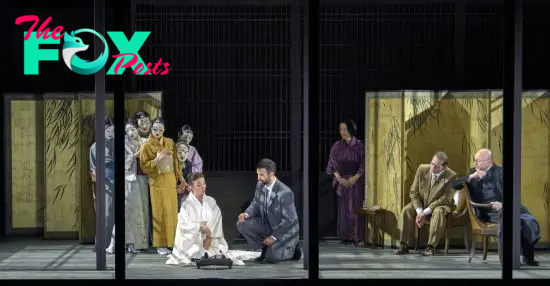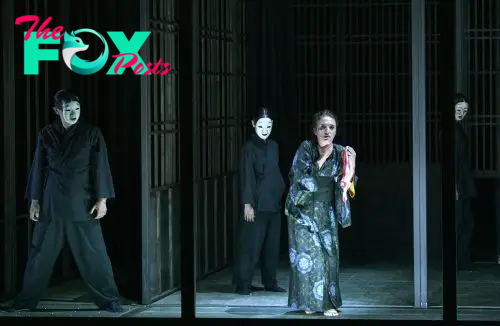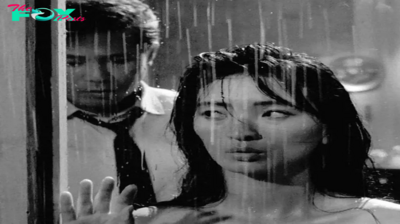Entertainment
This Aix-en-Provence manufacturing quietly, powerfully rethought and reimagined Madama Butterfly ŌĆō Seen and Heard Worldwide
 France Pageant dŌĆÖAix-en-Provence [1] ŌĆō Puccini, Madama Butterfly: Soloists, Lyon Opera Refrain (refrain grasp: Benedict Kearns), Lyon Opera Orchestra / Daniele Rustoni (conductor). Th├®├ótre de lŌĆÖArchevech├®, Aix-en-Provence, 8.7.2024. (MB)
France Pageant dŌĆÖAix-en-Provence [1] ŌĆō Puccini, Madama Butterfly: Soloists, Lyon Opera Refrain (refrain grasp: Benedict Kearns), Lyon Opera Orchestra / Daniele Rustoni (conductor). Th├®├ótre de lŌĆÖArchevech├®, Aix-en-Provence, 8.7.2024. (MB)

Manufacturing:
Director ŌĆō Andrea Breth
Set designs ŌĆō Raimund Orfeo Voigt
Costumes ŌĆō Ursula Renzenbrink
Lighting ŌĆō Alexander Koppelmaan
Dramaturgy ŌĆō Klaus Bertisch
Forged:
Cio-Cio San ŌĆō Ermonela Jaho
B.F. Pinkerton ŌĆō Adam Smith
Suzuki ŌĆō Mihoko Fujimura
Sharpless ŌĆō Lionel Lhote
Goro ŌĆō Carlo Bosi
The Bonze ŌĆō Inho Jeong
Prince Yamadori ŌĆō Kristofer Lundin
Kate Pinkerton ŌĆō Albane Carr├©re
Imperial Commissioner ŌĆō Kristj├Īn J├│hannnesson
Madama Butterfly has turn into a troublesome opera to stage, largely on account of its deeply problematical material, but in addition its dramatic straightforwardness. Does one simply ignore the previous insofar as potential, maybe firming down what may need been acceptable to some a few a long time in the past but would now not be thought of to be; or does one tackle a few of its points head on and, at the very least for some, threat it buckling below the burden of a vital equipment it’ll wrestle to help onstage? Its orientalism (or worse) won’t go away, so one goes to need to take a view whether or not one likes it or not; likewise, the cruelty inextricably linked with the sympathy it voices and evokes. And assuming one shouldn’t be going to take the road that there’s nothing unsuitable with PinkertonŌĆÖs actions or certainly American imperialism, is there actually a lot to interpret, as opposed to attract out?
Andrea Breth seems to assume not ŌĆö or at the very least declines to take action. She doesn’t try any grand re-evaluation of the opera, however she does heighten its nastiness and, finally, the facility of its tragedy. Breth doesn’t impose an idea, good, dangerous, or detached, upon the work, however has clearly thought each about its issues and the drama that lies in its element and presents them with readability and integrity. The place the opening scene can usually appear a mere prelude, albeit a mandatory one, right here we’re confronted with the horror of what’s there from the beginning: the racism, imperialism, and misogyny of Pinkerton abundantly clear in his dismissive remedy of Suzuki. She barely registers as a human being as he takes off his sneakers. Save for her, it is usually, previous to Cio-Cio SanŌĆÖs arrival, a completely (heterosexual) male surroundings ŌĆö and it feels prefer it. No matter it’s ŌĆō ŌĆśloveŌĆÖ hardly appears the phrase ŌĆō that Pinkerton feels for his bride, its roots are on this context. Suzuki, furthermore, is aware of exactly what’s going on and tells us so, lengthy earlier than she says a phrase; BrethŌĆÖs route and Mihoko FujimuraŌĆÖs performing are as one.
Furthermore, Breth doesn’t try to ŌĆśperceiveŌĆÖ Japanese tradition. Within the programme, she freely admits that she doesn’t and can’t, in distinction with PucciniŌĆÖs then typical but, for us, deeply problematical acts of appropriation. It’s troublesome, maybe inconceivable, even to speak about this with out orientalising, however notion, each its truths and its lies, stands on the coronary heart of a story involved with mutual incomprehension in addition to deeply stacked scales. Light designs recommend one thing retrospective, a refusal to resort to ŌĆśvibrantŌĆÖ caricature, or each; so does lighting that seems extra dialectical than crudely binary in its portrayal of lightness and darkness. Masked actors play ButterflyŌĆÖs household, while their voices come from singers, virtually unseen, at nighttime surrounding the stage. Furthermore, the tempo of their ŌĆśmotionŌĆÖ, if one can name that it in any respect, is sort of totally different from PucciniŌĆÖs. To our eyes ŌĆō and ears ŌĆō they gradual it down, however maybe therein lies some type of resistance in addition to distinction. And naturally, in most respects, they’re proper. Breth makes a lot, although something however crudely, of Kate PinkertonŌĆÖs arrival and act of child-possession, sealing the merciless tragedy, while ButterflyŌĆÖs suicide is horrible, because it should be, although in no sense gratuitously so. Actors and singers, in spite of everything, play characters; they don’t (straightforwardly) turn into them, at the very least from a Brechtian standpoint. Certainly, the connection between realism and different potentialities is likely to be mentioned to lie on the coronary heart of the manufacturing, as maybe of the work and the way we would now strategy it.
Daniele RustoniŌĆÖs conducting of a tremendous forged and Lyon Opera forces mixed apparently with BrethŌĆÖs staging. I’m positive it might be distorting to say that one decided the opposite, however one definitely had the impression of interaction. RustoniŌĆÖs related consideration to element contributed to, slightly than detracting from, a larger sense of the entire. His tempi, particularly within the first act, I used to be much less positive about; that act particularly got here to look more and more drawn out. But, thought of as a complete, that appeared very a lot in line with the (masked) disinclination to hurry, and paid off handsomely within the second and third acts, the place ghosts of Tristan und Isolde particularly enlightened and discomfited. The erotics of this efficiency could possibly be skilled each instantly and at a classy degree of mediation, as with its different qualities.

That definitely included singing. To start with, I felt barely troubled by an obvious lack of dramatic verisimilitude in regards to the two central characters, struggling to attain mandatory suspension of perception given a piece aesthetic that appears, although maybe solely appears, to insist on realism. There have been instances, furthermore, when the tessitura of ButterflyŌĆÖs position appeared to pressure Ermonela Jaho. Because the opera progressed, and as JahoŌĆÖs dramatic dedication, bordering on possession, took over, she moved in a particular approach that heightened a way of each issues and alternatives within the work ŌĆśitselfŌĆÖ, her last scene as true and mandatory a climax as one might hope for. SmithŌĆÖs thankless position was extra ŌĆśstraightforwardlyŌĆÖ convincing, as likely it needs to be. He didn’t flinch from having us detest him, balancing the tough imperatives of vanity in character and thoughtfulness of portrayal. FujimuraŌĆÖs self-revelation was deeply spectacular all through, while Lionel Lhote (likely with BrethŌĆÖs assist) offered a compassionate, understanding, subtly memorable Sharpless. With smaller roles all properly taken, there was a robust sense of unity in larger dramatic service. Nearly regardless of itself, but additionally by itself account, this Aix manufacturing quietly, powerfully rethought and reimagined PucciniŌĆÖs opera.
Mark Berry
-

 Entertainment3h ago
Entertainment3h agoNatasha Rothwell on Her Memorable Firsts
-

 Entertainment8h ago
Entertainment8h agoFace Me and Other Korean Medical Crime Shows That are Must Watch
-

 Entertainment14h ago
Entertainment14h agoClassic Korean Movies Like Piagol to Add to Your Watch List
-

 Entertainment14h ago
Entertainment14h agoOver 60 Million People Tuned in to Watch Jake Paul┬Āvs. Mike Tyson
-

 Entertainment21h ago
Entertainment21h agoPopular Hudson Valley Italian Restaurant Addresses Closing Rumors
-

 Entertainment22h ago
Entertainment22h agoRHOBHŌĆÖs Dorit Kemsley Addresses Viral Smoking Scene on Season 14 Premiere: ŌĆśI Was Being ChasedŌĆÖ
-

 Entertainment1d ago
Entertainment1d agoThe 10 Best Podcasts of 2024
-

 Entertainment1d ago
Entertainment1d agoŌĆśRHOBHŌĆÖ Star Dorit Kemsley Opens Up About Crumbling Marriage to PK: ŌĆśAgreed to SeparateŌĆÖ


























